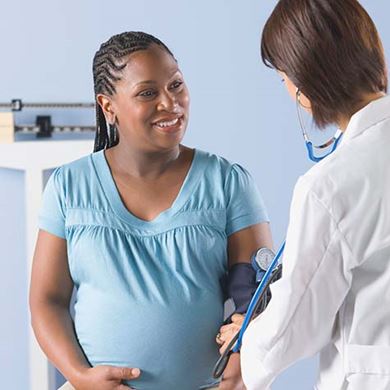Advancing Maternal Health
Heart disease during pregnancy leaves women with a higher lifetime risk of cardiovascular disease after delivery and leads to an increased risk for their children.
Advancing Maternal Health
Closing the Gaps in Cardiovascular Care
As many as two-thirds of CVD-related pregnancy deaths could be prevented by bridging gaps in care with appropriate surveillance, prevention and treatment strategies from preconception to a reimagined fourth trimester of postpartum care. Learn more about cardio-obstetrics in this toolkit for healthcare professionals.

eModules

The Role of Cardiovascular Health in Maternal Health
This module, guided by experts, explores the heightened cardiovascular risks and comorbidities in pregnant and recently pregnant individuals, particularly among women of color, with a focus on improving women's health and addressing maternal health disparities.
Claim CE and ABIM MOC Credit

Hypertensive Disorders of Pregnancy
Opportunity for Postpartum Health Optimization
This course provides healthcare professionals with essential knowledge on hypertensive disorders in pregnancy, including postpartum preeclampsia, and teaches how to differentiate conditions and address barriers to effective postpartum blood pressure monitoring.

Acute Coronary Syndrome
& Pregnancy-Related Spontaneous Coronary Artery Dissection
This course helps healthcare professionals understand acute coronary syndrome (ACS) and pregnancy-related spontaneous coronary artery dissection (SCAD), including the incidence, causes, and appropriate treatment approaches for pregnancy-associated myocardial infarction and SCAD.
HeartBEATS from Lifelong Learning™
Digital Learning

Peripartum Cardiomyopathy
This digital learning reviews the prevalence of peripartum cardiomyopathy (PPCM), risk factors, clinical presentation and management.
Management of Arrhythmias in Pregnant Patients
This digital learning reviews the epidemiology of arrhythmias, treatment management, and the safety of medications and invasive treatment during pregnancy and postpartum.
Pregnancy and Valvular Heart Disease
Learn more about the maternal and neonatal risks associated with VHD during pregnancy, risk stratification, and management, including anticoagulation choice, as applicable, during pregnancy and postpartum.
Hypertensive Disorders in Pregnancy
Explore the diagnosis and management of hypertensive disorders of pregnancy (HDP), and their role in long-term maternal cardiovascular health.AHA Publications on Maternal Health
Overview
Assessing and Addressing Cardiovascular and Obstetric Risks in Patients Undergoing Assisted Reproductive Technology Status of Maternal Cardiovascular Health in American Indian and Alaska Native Individuals Appraising the Preclinical Evidence of the Role of the Renin-Angiotensin-Aldosterone System in Antenatal Programming of Maternal and Offspring Cardiovascular Health Across the Life Course: Moving the Field Forward Call to Action: Maternal Health and Saving Mothers Opportunities in the Postpartum Period to Reduce Cardiovascular Disease Risk After Adverse Pregnancy Outcomes Adverse Pregnancy Outcomes and Cardiovascular Disease Risk: Unique Opportunities for Cardiovascular Disease Prevention in Women -
Cardiovascular Considerations in Caring for Pregnant Patients Optimizing Prepregnancy Cardiovascular Health to Improve Outcomes in Pregnant and Postpartum Individuals and Offspring JAHA Spotlight on Pregnancy and Its Impact on Maternal and Offspring Cardiovascular Health JAHA Spotlight: Go Red For Women. Cardio-Obstetrics: Moving Beyond Programming to Action 2025 CPR/ECC Guidelines
Hypertensive Disorders
-
De Novo Postpartum Hypertension Is Pregnancy a Stress Test or Risk Factor. Hypertension. 18 Jan 2023. Hypertension in Pregnancy: Diagnosis, Blood Pressure Goals, and Pharmacotherapy: A Scientific Statement From the American Heart Association | Hypertension 12/15/2021. Preeclampsia | Circulation Research 03/28/2019. Preeclampsia | Stroke 02/08/2018. Preeclampsia Is Associated With Persistent Postpartum Cardiovascular Impairment | Hypertension 08/15/2011.
Cardiomyopathies
CVD Risk and Equity
Promoting Risk Identification and Reduction of Cardiovascular Disease in Women Through Collaboration With Obstetricians and Gynecologists: A Presidential Advisory From the American Heart Association and the American College of Obstetricians and Gynecologists | Circulation 06/12/2018 Adverse Pregnancy Outcomes and Cardiovascular Disease Risk: Unique Opportunities for Cardiovascular Disease Prevention in Women: A Scientific Statement From the American Heart Association | Circulation 03/29/2021
Advancing Postpartum Systems of Care Initiative
 The American Heart Association (AHA) has launched a comprehensive initiative, Advancing Maternal Health Through Quality Improvement and Professional Education, with funding support from Merck for Mothers.
The American Heart Association (AHA) has launched a comprehensive initiative, Advancing Maternal Health Through Quality Improvement and Professional Education, with funding support from Merck for Mothers.This initiative seeks to improve postpartum systems of care related to cardiovascular health, uncover barriers and models for guideline-based postpartum care implementation, and more.